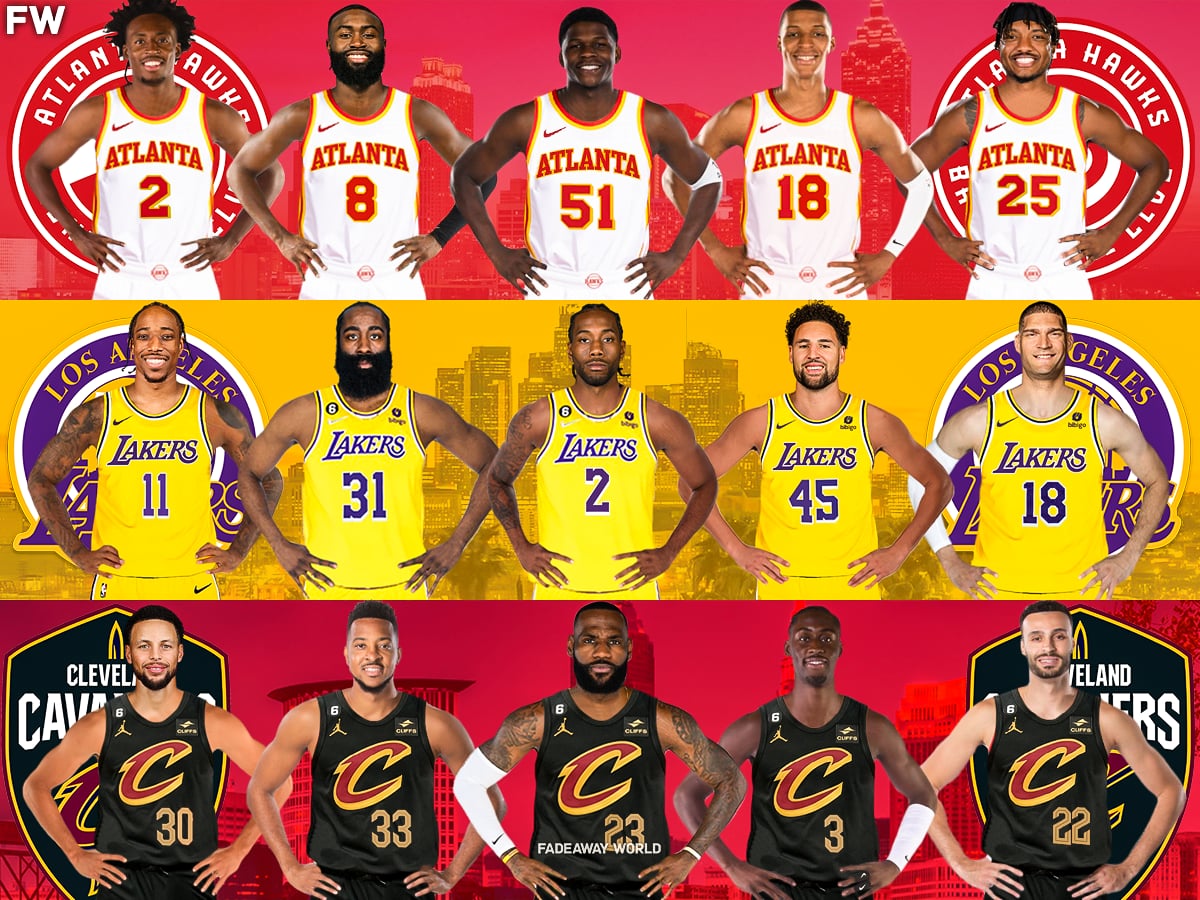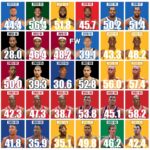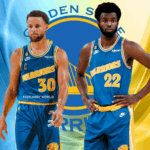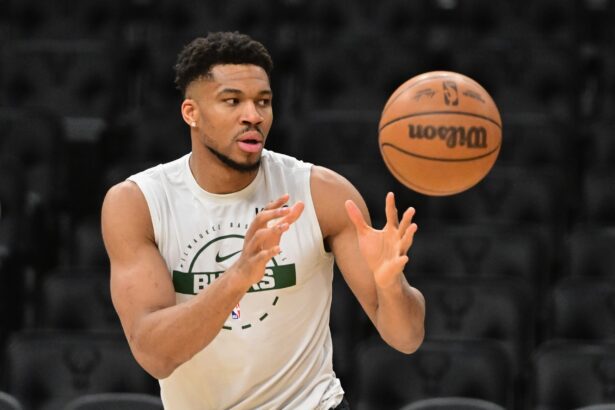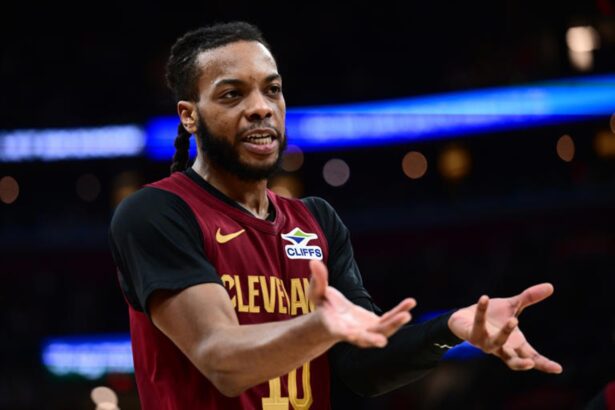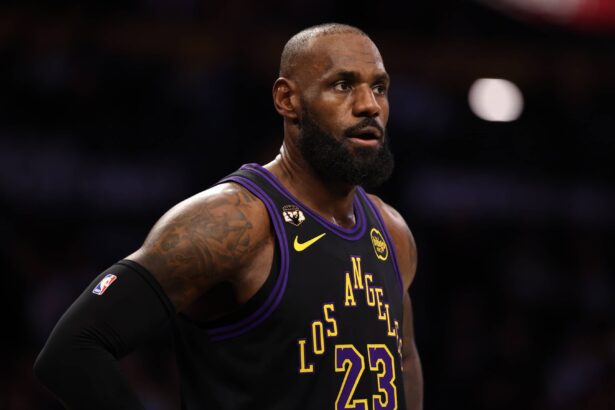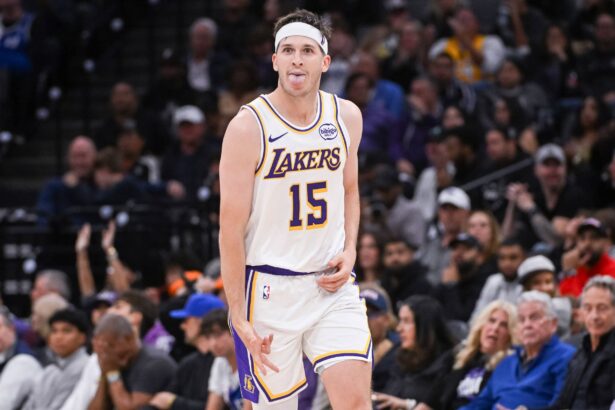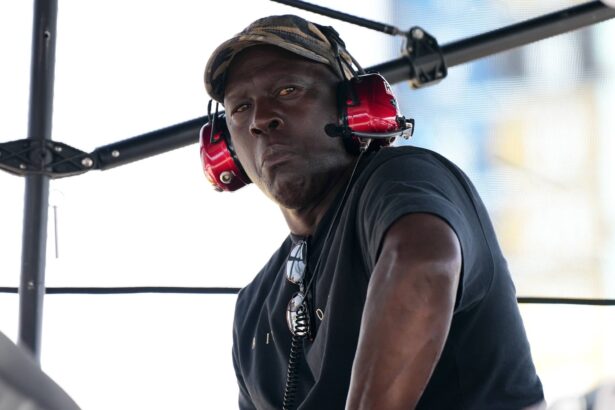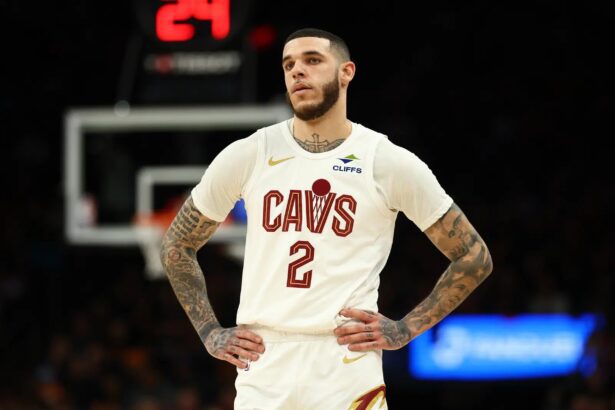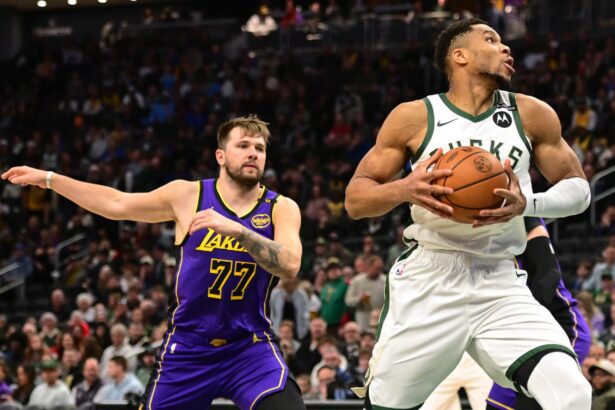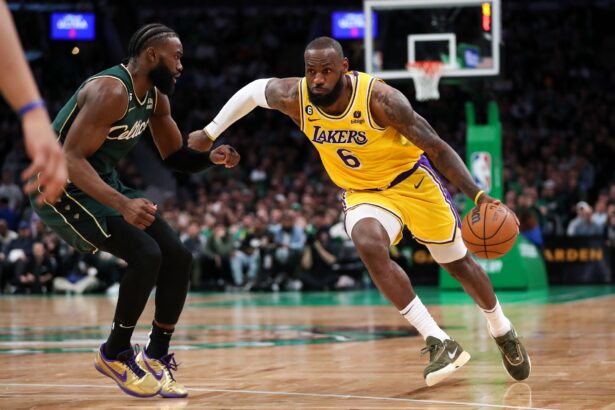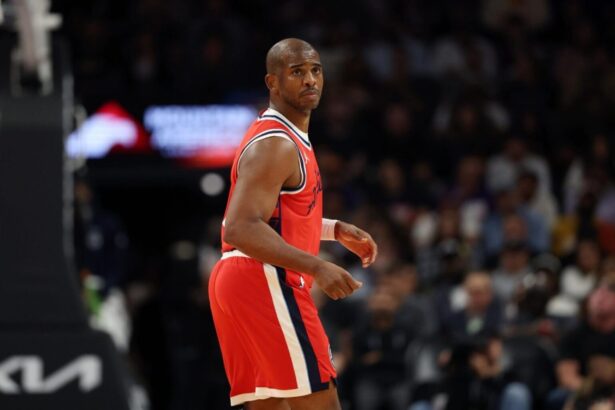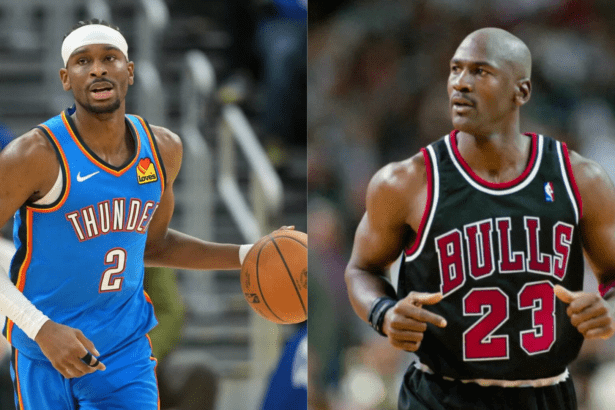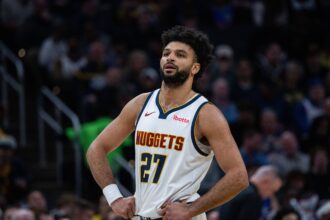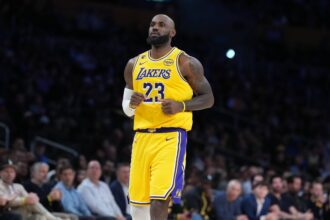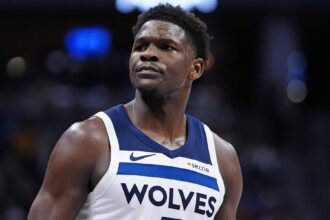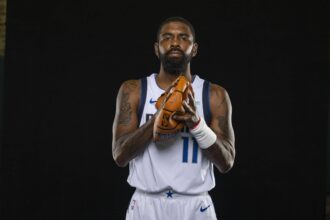The NBA has 30 teams that are located in 22 states in the United States of America. Only California (four), Texas (three), New York (two), and Florida (two) have multiple teams in the same state. To find out where the best players in the league originate, we have collected the best players from every city to form the best starting lineup possible. The players chosen will be based on where they were born, with closest proximity to a city with an NBA team.
- 1. Cleveland Cavaliers
- 2. Los Angeles Lakers And Clippers
- 3. Atlanta Hawks
- 4. Dallas Mavericks
- 5. Detroit Pistons
- 6. Charlotte Hornets
- 7. Milwaukee Bucks
- 8. New York Knicks And Brooklyn Nets
- 9. Chicago Bulls
- 11. Indiana Pacers
- 12. Portland Trail Blazers
- 13. Toronto Raptors
- 14. New Orleans Pelicans
- 15. Houston Rockets
- 16. Philadelphia 76ers
- 17. Minnesota Timberwolves
- 18. Orlando Magic
- 19. Miami Heat
- 20. Oklahoma City Thunder
- 21. Memphis Grizzlies
- 22. Phoenix Suns
Note: The Boston Celtics, Washington Wizards, Denver Nuggets, San Antonio Spurs, Utah Jazz, and Sacramento Kings are excluded from this ranking as there aren’t enough players currently on NBA rosters.
1. Cleveland Cavaliers
Starters: Stephen Curry, CJ McCollum, Caris LeVert, LeBron James, Larry Nance Jr.
The Cleveland Cavaliers would field a star-studded lineup featuring elite scoring, playmaking, and defensive prowess. Stephen Curry and CJ McCollum (19.7 PPG) would form a dynamic backcourt, with Curry’s unparalleled shooting range and playmaking ability complementing McCollum’s sharpshooting and scoring skills. Caris LeVert’s versatility and ability to create his own shot (14.0 PPG) would further bolster the Cavaliers’ offensive capabilities. Anchoring the frontcourt, LeBron James would provide leadership, elite playmaking, and championship experience. His partnership with Curry would be crucial, as their combined ability to share playmaking responsibilities and create scoring opportunities would form the backbone of the team’s offensive strategy.
Larry Nance Jr. would round out the starting lineup with his energy, athleticism, and defensive versatility, providing a solid presence in the paint and adding depth to the frontcourt rotation. The key combination for the Cavaliers would undoubtedly be the partnership between Stephen Curry and LeBron James. Their ability to share playmaking responsibilities and create scoring opportunities for themselves and their teammates would be crucial to the team’s offensive success and they can form the best hometown team in the NBA.
2. Los Angeles Lakers And Clippers
Starters: James Harden, DeMar DeRozan, Klay Thompson, Kawhi Leonard, Brook Lopez
The Los Angeles Lakers/Clippers would feature a formidable starting lineup with a blend of elite scoring, playmaking, and defensive prowess. Since both teams compete in Los Angeles, they have a massive chance to select the best of the pack from the city. James Harden would take the lead as the primary playmaker, utilizing his scoring ability and court vision to orchestrate the offense.
DeMar DeRozan (23.7 PPG) and Klay Thompson (38.6% 3-PT FG) would add to the team’s offensive firepower, with DeRozan’s mid-range game and Thompson’s sharpshooting providing a balanced scoring attack. Kawhi Leonard would anchor the team on both ends of the floor, bringing his two-way excellence, playoff experience, and championship pedigree. Brook Lopez, with his size, rim protection, and three-point shooting, would round out the starting lineup,
The key combination for Los Angeles would undoubtedly be the partnership between James Harden and Kawhi Leonard. Their combined scoring, playmaking, and defensive capabilities would form the backbone of the team’s offensive and defensive strategies, making the team a strong contender for the NBA championship with their All-Star talent and championship experience. DeMar DeRozan and Klay Thompson, both All-Star caliber players, would add scoring depth, offensive versatility, and perimeter shooting to the Lakers/Clippers’ lineup, making the team’s offense difficult to contain.
3. Atlanta Hawks
Starters: Collin Sexton, Anthony Edwards, Jaylen Brown, Jabari Smith Jr., Wendell Carter Jr.
The Atlanta Hawks would showcase a young and dynamic starting lineup with a blend of scoring, athleticism, and defensive potential. Collin Sexton would lead the backcourt, bringing his scoring ability and playmaking skills to the table. Anthony Edwards (26.3 PPG), known for his explosive athleticism and scoring prowess, would complement Sexton with his ability to create his own shot and attack the rim. Jaylen Brown (23.1 PPG) would provide scoring, defensive versatility, and playoff experience, adding a balanced two-way presence to the lineup.
Jabari Smith Jr., as a highly touted rookie with a versatile skill set and scoring ability, would offer another scoring threat and playmaking option. Wendell Carter Jr. would anchor the frontcourt with his rebounding, rim protection, and inside scoring, rounding out the lineup with his defensive presence and offensive versatility. The key combination for the Hawks would likely be the partnership between Collin Sexton and Anthony Edwards, with their combined scoring and playmaking abilities being crucial to the team’s offensive success.
Overall, the Hawks’ starting lineup of Collin Sexton, Anthony Edwards, Jaylen Brown, Jabari Smith Jr., and Wendell Carter Jr. would be an exciting and promising young group with the potential to develop into a competitive team in the NBA.
4. Dallas Mavericks
Starters: Trae Young, Tyrese Maxey, Cade Cunningham, Julius Randle, Myles Turner
Trae Young (26.1 PPG, 10.8 APG) would take the helm as the primary playmaker, using his elite ball-handling, court vision, and three-point shooting to orchestrate the offense. Tyrese Maxey would provide additional scoring and playmaking from the shooting guard position, adding a dynamic scoring threat and perimeter shooting. Cade Cunningham, the 2021 No. 1 overall draft pick, would add to the team’s offensive versatility and playmaking ability.
Julius Randle, with his scoring ability and strength in the paint, would be a dominant force in the low post, providing a strong inside scoring presence and occupying the paint. Myles Turner would round out the lineup with his rim protection, shot-blocking, and ability to stretch the floor with his three-point shooting. Young’s playmaking and Randle’s scoring ability would form a potent offensive duo that would be difficult for opposing teams to defend.
Overall, the Mavericks’ starting lineup of Trae Young, Tyrese Maxey, Cade Cunningham, Julius Randle, and Myles Turner would be a small but dynamic and versatile group capable of running, scoring, and shooting at a high level, showcasing the Mavericks’ commitment to building a high-powered offensive team.
5. Detroit Pistons
Starters: Monte Morris, Devin Booker, Kyle Kuzma, Miles Bridges, Draymond Green
The Detroit Pistons would field a starting lineup characterized by size, athleticism, and a balanced blend of scoring and defensive capabilities. Devin Booker (27.2 PPG) would be the primary scoring threat, utilizing his scoring prowess and ability to create his own shot to generate offense. Kyle Kuzma would contribute with his scoring versatility and floor-spacing ability, adding another scoring option and perimeter threat.
Miles Bridges, known for his athleticism and scoring ability, would provide energy, rebounding, and additional scoring punch. Draymond Green would anchor the defense and bring his playmaking and championship experience to the team, serving as the defensive anchor and facilitating from the forward position.
The key combination for the Pistons would likely be between Devin Booker and Draymond Green. Booker’s scoring ability and Green’s defensive prowess and playmaking would form the core of the Pistons’ offensive and defensive strategies. Overall, the Pistons’ starting lineup of Monte Morris, Devin Booker, Kyle Kuzma, Miles Bridges, and Draymond Green would be a versatile and balanced group capable of competing on both ends of the floor and showcasing the Pistons’ commitment to building a competitive team with a mix of scoring, athleticism, and defensive skill.
6. Charlotte Hornets
Starters: Chris Paul, Coby White, Saddiq Bey, Brandon Ingram, Zion Williamson
The Charlotte Hornets would feature a starting lineup with a mix of veteran leadership, scoring prowess, and youthful energy. Chris Paul would lead the team as the floor general, even at 38 years old (6.9 APG). Coby White would provide scoring and playmaking from the shooting guard position, adding a dynamic scoring threat and perimeter shooting (19.0 PPG on 37.8% from three). Saddiq Bey would contribute with his three-point shooting and defensive versatility, spacing the floor and providing solid defense.
Brandon Ingram, known for his scoring ability and offensive versatility, would add another scoring option and playmaking ability to the lineup. Zion Williamson would be the focal point in the frontcourt, using his athleticism, strength, and scoring ability to dominate in the paint and create mismatches.
The key combination for the Hornets would likely be between Chris Paul and Zion Williamson. Paul’s playmaking and Williamson’s scoring ability and athleticism would form a potent offensive duo that would be difficult for opposing teams to defend. Ingram also has experience competing with Williamson and we have already seen how great that duo can be.
7. Milwaukee Bucks
Starters: Tyrese Haliburton, Jordan Poole, Tyler Herro, Jalen Johnson, Kevon Looney
Despite not having defensive resistance, the Milwaukee Bucks hometown team will field terrific offensive players. Tyrese Haliburton would lead the offense as the point guard (20.3 PPG, 10.9 APG), using his playmaking, basketball IQ, and perimeter shooting to create scoring opportunities for his teammates. Jordan Poole and Tyler Herro would add to the team’s offensive firepower, with their scoring ability, three-point shooting, and ability to create their own shot providing a dynamic perimeter scoring threat.
Kevon Looney would anchor the frontcourt with his rebounding, defensive presence, and ability to finish around the rim, rounding out the lineup with his energy and hustle. The key combination for the Bucks would likely be between Tyrese Haliburton and Jordan Poole.
Haliburton’s playmaking and Poole’s scoring ability would form a potent offensive duo that would be difficult for opposing teams to defend. Overall, the Bucks’ starting lineup of Tyrese Haliburton, Jordan Poole, Tyler Herro, Jalen Johnson, and Kevon Looney would be a young and dynamic group capable of scoring from the perimeter to outsource the opponent.
8. New York Knicks And Brooklyn Nets
Starters: Terance Mann, Donovan Mitchell, Kevin Huerter, Tobias Harris, Andre Drummond
There are two NBA franchises based in New York and there is a talent pool that fits well together. The star of the team, Donovan Mitchell, would be a primary offensive weapon for the side, using his ability to create his own shot and attack the rim to generate offense (26.5 PPG).
Kevin Huerter would add to the team’s offensive firepower with his three-point shooting and floor spacing, providing a lethal perimeter threat. Tobias Harris, with his scoring ability, versatility, and size at the forward position, would be a key contributor to New York’s offensive and defensive efforts. Andre Drummond would anchor the frontcourt with his rebounding, shot-blocking, and presence in the paint.
Mitchell’s scoring ability and Harris’ offensive versatility would form a potent offensive duo that would be difficult for opposing teams to defend. Overall, the starting lineup of Terance Mann, Donovan Mitchell, Kevin Huerter, Tobias Harris, and Andre Drummond would be a balanced and dynamic group capable of scoring from the perimeter and dominating in the paint, showcasing New York’s commitment to building a competitive team with a mix of scoring, perimeter shooting, and frontcourt strength.
9. Chicago Bulls
Starters: Derrick Rose, Fred VanVleet, Max Strus, Robert Covington, Anthony Davis
Derrick Rose would lead the offense as the point guard, using his playmaking, scoring ability, and basketball IQ to orchestrate the offense as one of the franchise’s greatest ever as the youngest MVP ever. Fred VanVleet would provide additional playmaking and perimeter shooting (8.1 APG), adding a dynamic scoring threat and three-point shooting to the backcourt. Max Strus, known for his sharpshooting and scoring ability, would provide spacing and a lethal perimeter threat.
Robert Covington would add defensive versatility, three-point shooting, and rebounding from the forward position, contributing on both ends of the floor. Anthony Davis (24.5 PPG, 12.6 RPG) would anchor the frontcourt with his scoring ability, rebounding, shot-blocking, and defensive prowess, providing a dominant inside presence and elevating the team’s defensive capabilities.
The key combination for the Bulls would likely be between Fred VanVleet and Anthony Davis. VanVleet’s playmaking and Davis’ scoring ability and defensive presence would form a potent offensive and defensive duo that would be difficult for opposing teams to handle.
10. Golden State Warriors
Starters: Damian Lillard, Tim Hardaway Jr, Amen Thompson, Ausar Thompson, Aaron Gordon
Damian Lillard (24.4 PPG, 7.0 APG)would lead the offense as the point guard from Oakland, utilizing his elite scoring ability, playmaking, and three-point shooting to orchestrate the offense. Tim Hardaway Jr. would provide additional scoring and perimeter shooting. Amen Thompson and Ausar Thompson, both highly touted brothers, would offer athleticism, scoring ability, and defensive versatility, adding a youthful and dynamic presence to the lineup.
Aaron Gordon would anchor the frontcourt with his rebounding, athleticism, and defensive prowess, providing a dominant inside presence and elevating the team’s defensive capabilities. The key combination for the Warriors would likely be between Damian Lillard and Aaron Gordon. Lillard’s playmaking and scoring ability combined with Gordon’s athleticism and defensive presence would form a potent offensive and defensive duo that would be difficult for opposing teams to handle.
11. Indiana Pacers
Starters: Darius Garland, Desmond Bane, Michael Porter Jr, Gordon Hayward, Mason Plumlee
Darius Garland would lead the offense as the point guard, using his playmaking, scoring ability, and three-point shooting (36.5%) to orchestrate the offense. Desmond Bane would provide additional scoring and perimeter shooting (38.1%), adding a dynamic scoring threat and floor spacing to the backcourt.
Michael Porter Jr., with his scoring ability, athleticism, and perimeter shooting (40.1%), would be a primary offensive weapon for the Pacers, using his skills to generate offense and create mismatches. Gordon Hayward, though undersized at power forward, would provide scoring, playmaking, and floor spacing, while Mason Plumlee would anchor the frontcourt with his rebounding.
Given the potential size and interior defense issues, the Pacers’ strategy would likely focus on elite shooting ability and floor spacing to open up driving lanes and create scoring opportunities from the perimeter. Overall, the Pacers’ starting lineup of Darius Garland, Desmond Bane, Michael Porter Jr., Gordon Hayward, and Mason Plumlee would be a well-rounded and dynamic group capable of scoring from the perimeter and playing an up-tempo style of basketball, although they will struggle to protect the paint.
12. Portland Trail Blazers
Starters: Scotty Pippen Jr, Cole Anthony, Jerami Grant, Domantas Sabonis, Isaiah Hartenstein
The Portland Trail Blazers lineup showcases a balanced mix of playmaking, scoring, and rebounding. Scotty Pippen Jr. is emerging as a promising young point guard, showing improvement in his playmaking skills. Cole Anthony provides scoring prowess with his ability to put up points effectively. Jerami Grant, a two-way player and fringe All-Star, adds scoring and defensive versatility to the lineup. Domantas Sabonis (19.4 PPG, 13.8 RPG) and Isaiah Hartenstein offer a strong presence in the paint, contributing rebounding and interior scoring.
With a well-rounded starting lineup, the Trail Blazers have a good combination of playmaking, scoring, and rebounding abilities. The success of the team will depend on the continued development of Pippen Jr. and Anthony, as well as the consistent contributions from Grant, Sabonis, and Hartenstein to compete effectively in the league.
13. Toronto Raptors
Starters: Shai Gilgeous-Alexander, Nickeil Alexander-Walker, RJ Barrett, Andrew Wiggins, Kelly Olynyk
The Toronto Raptors’ starters are anchored by Shai Gilgeous-Alexander (30.4 PPG), a superstar offensive player who will be the focal point of the team’s offense. Nickeil Alexander-Walker and RJ Barrett add athleticism and scoring ability to the backcourt, complementing Shai’s playmaking and offensive prowess. Andrew Wiggins brings additional athleticism and scoring to the lineup, while Kelly Olynyk provides floor spacing as a center with his three-point shooting.
Despite Shai’s star presence, the Raptors might struggle defensively, especially inside, which could limit their ranking despite the offensive talent on the Canadian team. That is the reason why a talented team like this ranks below the rest because they don’t have a legitimate defender.
14. New Orleans Pelicans
Starters: De’Aaron Fox, Aaron Holiday, Kelly Oubre Jr, Thaddeus Young, Robert Williams
The New Orleans Pelicans starting lineup is led by All-Star De’Aaron Fox (26.6 PPG, 5.6 APG), who will shoulder much of the scoring and playmaking responsibilities. Fox is surrounded by athletic talents like Kelly Oubre Jr. and Robert Williams, who provide both offensive and defensive contributions. Aaron Holiday adds perimeter shooting and defensive capabilities to the lineup, helping to space the floor and defend opposing guards. Thaddeus Young brings veteran experience and versatility to the forward position, contributing both scoring and playmaking.
Despite the talent and athleticism on the roster, much of the pressure will fall on De’Aaron Fox to carry a heavy load in terms of scoring and playmaking. The success of the Pelicans will largely depend on Fox’s ability to lead the team offensively and create opportunities for his teammates, as well as the supporting cast’s ability to contribute consistently on both ends of the floor.
15. Houston Rockets
Starters: Alex Caruso, Quentin Grimes, Jimmy Butler, Jarred Vanderbilt, DeAndre Jordan
Houston’s lineup is built around a strong defensive foundation and veteran leadership. Alex Caruso and Quentin Grimes bring defensive intensity and perimeter shooting to the backcourt, setting the tone for the team’s defensive identity. Jimmy Butler serves as the primary scoring option and playmaker, bringing both offensive firepower and leadership to the lineup.
Jarred Vanderbilt adds athleticism, rebounding, and defensive versatility at the forward position, contributing to the team’s overall defensive effort and providing energy on both ends of the floor. DeAndre Jordan anchors the defense in the paint with his shot-blocking, rebounding abilities, and veteran presence, even at 35 years old. The Rockets’ strength primarily lies in their defensive capabilities, but they will struggle highly to score against other teams.
16. Philadelphia 76ers
Starters: Kyle Lowry, De’Andre Hunter, Mikal Bridges, Cameron Johnson, Dereck Lively III
The Philadelphia 76ers’ starting lineup is characterized by a lack of star power but is anchored by strong two-way players. Kyle Lowry, at 38 years old, brings veteran leadership and playmaking ability to the team, although he is past his prime. De’Andre Hunter adds scoring and defensive versatility to the lineup, while Mikal Bridges stands out as an excellent two-way player, providing scoring and defensive prowess. Cameron Johnson’s floor-spacing ability allows Dereck Lively III to focus on manning the middle, utilizing his size and shot-blocking to protect the paint.
Despite Mikal Bridges’ excellence as a two-way player, the 76ers lack a true superstar on the roster, which could pose challenges in terms of offensive firepower and playmaking. The team’s success will likely hinge on its defensive cohesion and the ability to share scoring responsibilities among the starting lineup.
17. Minnesota Timberwolves
Starter: Tre Jones, Tyus Jones, Jalen Suggs, David Roddy, Chet Holmgren
The Minnesota Timberwolves starting lineup is built around the unique presence of 7’1″ Chet Holmgren, creating a small lineup with limited size and star power across the perimeter. Tre Jones and Tyus Jones offer playmaking and perimeter defense but lack the offensive firepower of star guards. Jalen Suggs will need to carry much of the scoring load for the team to be successful, given the lack of star power and size. David Roddy provides additional scoring and playmaking from the forward position, but the burden will primarily fall on Suggs and Holmgren to produce consistently.
While there is some talent on the roster, particularly with the potential of Suggs and the unique skills of Holmgren, the Timberwolves face challenges due to the lack of star power and size across the perimeter. The success of the team will largely depend on Suggs’ ability to score at a high level and create opportunities, as well as Holmgren’s ability to dominate inside and make an impact on both ends of the floor.
18. Orlando Magic
Starters: Tre Mann, Anfernee Simons, Grayson Allen, Nassir Little, Mitchell Robinson
Orlando’s starting lineup features several shooters in Anfernee Simons, Grayson Allen, and Tre Mann, providing floor spacing and perimeter scoring. Mitchell Robinson adds rebounding and rim protection, but the team lacks high-level scoring and may struggle defensively with only Allen and Robinson considered above-average defenders. Despite the recognized talent on the roster, particularly in shooting and rim protection, the Magic will likely face challenges in scoring consistency and defensive effectiveness.
The success of the Magic will hinge on their ability to maximize their shooting capabilities and rely on Robinson’s presence in the paint defensively. However, the team may struggle to defend at a high level and will need to find ways to generate consistent scoring to compete effectively in the league.
19. Miami Heat
Starters: Jordan Clarkson, Josh Minott, Scottie Barnes, RaiQuan Gray, Taylor Hendricks
The Miami Heat’s starting lineup is anchored by Scottie Barnes (19.9 PPG, 8.2 RPG, 6.1 APG), who will carry a heavy burden as the primary scorer, rebounder, and playmaker for the team. Barnes has shown the talent to perform at an All-Star level, contributing across multiple facets of the game. Jordan Clarkson adds scoring punch but lacks natural playmaking abilities, requiring him to adapt his game to create opportunities for his teammates. Josh Minott, RaiQuan Gray, and Taylor Hendricks are typically bench players and will need to perform outside of their usual roles to support Barnes and Clarkson effectively.
While Scottie Barnes has the talent to be a standout player, the Heat face challenges due to the lack of established starters and the need for bench players to step up in expanded roles. The success of the team will largely depend on Barnes’ ability to elevate his game and the supporting cast’s ability to perform beyond their typical capabilities to support him and Clarkson effectively.
20. Oklahoma City Thunder
Starters: Shake Milton, Lindy Waters III, Josh Richardson, Jeremy Sochan, Jaxson Hayes
The Oklahoma City Thunder’s starting lineup is characterized by a lack of starting-caliber players, which will likely result in challenges both offensively and defensively. Shake Milton and Josh Richardson are the most experienced players in the lineup, but the team will struggle to generate consistent scoring and may face difficulties defending at a high level. Lindy Waters III, Jeremy Sochan (11.6 PPG, 6.4 RPG, 3.4 APG), and Jaxson Hayes will need to step up and perform beyond their typical capabilities to support Milton and Richardson effectively.
Given the lack of established talent and experience in the starting lineup, the Thunder are expected to face significant challenges in both scoring and defending against more competitive teams in the league. The success of the team will largely depend on the collective effort of the young and inexperienced roster to develop and compete at a higher level over time.
21. Memphis Grizzlies
Starters: Cameron Payne, Keon Johnson, Garrison Matthews, Brandon Miller, James Wiseman
The Memphis Grizzlies’ starting lineup features a mix of veteran experience and young talent, but the players lack significant impact in terms of scoring and playmaking. Cameron Payne provides veteran leadership but may not be a consistent scoring threat. Keon Johnson is averaging 7.0 PPG this season, indicating a limited offensive contribution. Garrison Matthews offers three-point shooting with a 44.9% success rate but doesn’t provide much else. James Wiseman brings athleticism to the lineup, but the team overall lacks a dominant scoring presence.
With a starting lineup that lacks a true impact player, the Grizzlies may struggle to generate consistent scoring and compete at a high level. The success of the team will largely depend on the collective effort and development of the young players to step up and contribute effectively on both ends of the floor.
22. Phoenix Suns
Starters: Ty Ty Washington Jr, Matisse Thybulle, Timmy Allen, Kevin Knox, Marvin Bagley III
The Phoenix Suns’ starting lineup is characterized by a lack of scoring threats, which may lead to prolonged scoring droughts during games. Ty Ty Washington Jr. is a young player who will need time to develop into a consistent scorer at the NBA level. Matisse Thybulle provides elite defensive skills (2-time All-Defensive Team selections) but doesn’t contribute much offensively. Timmy Allen, Kevin Knox, and Marvin Bagley III have shown potential but have been inconsistent in their scoring outputs.
Despite having an elite defensive player in Thybulle and the potential for Bagley III to have some impactful games, the Suns will likely struggle to perform well due to the lack of consistent scoring options. The success of the team will largely depend on the development of the young players and their ability to improve their offensive capabilities to compete effectively in the league.
Thank you for being a valued reader of Fadeaway World. If you liked this article, please consider following us on Google News. We really appreciate your support.

